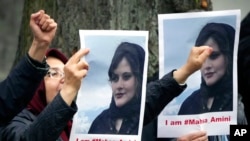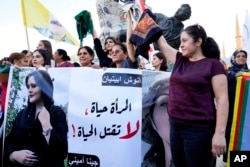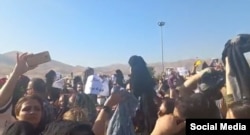The U.S. Treasury Department announced new sanctions against seven Iranian security and morality police officials on Thursday, accusing them of violating the rights of women, civil society activists and peaceful protesters.
The new sanctions target the head of Iran's notorious morality police, Mohammad Rostami Cheshmeh Gachi, and the force's director for Tehran, Haj Ahmad Mirzaei. Mirzaei has reportedly been suspended from his post following protests to the death of a young Iranian woman, Mahsa Amini, under his watch.
Amini, 22, was pronounced dead at a hospital on September 16 after spending three nights at a morality detention center in Tehran where she was allegedly tortured for not properly wearing a headscarf.
The U.S. sanctions also target Esmail Khatib, Iran's Minister of Intelligence, Salar Abnoush, deputy commander of the Basij forces, Qasem Rezaei, deputy commander of Law Enforcement Forces (LEF), Manouchehr Amanollahi, an LEF provincial commander, and Kiyumars Heidari, the commander of the Iranian army's ground forces.
"These officials oversee organizations that routinely employ violence to suppress peaceful protesters and members of Iranian civil society, political dissidents, women's rights activists, and members of the Iranian Baha'i community," the Treasury said in a statement on Thursday.
Under the sanctions, all properties and assets of these Iranian officials in the United States will be blocked and any financial dealings with them, in the U.S. and abroad, are prohibited.
"The ultimate goal of sanctions is not to punish, but to bring about a positive change in behavior," the Treasury statement added.
Dozens of other Iranian officials, entities and other individuals are already under U.S. sanctions for various reasons such as alleged support for terrorism, nuclear weapons, and human rights violations.
Widespread protests
Amini's death has sparked widespread protests throughout Iran and in several cities around the world.
Multiple protesters have reportedly died in Iran over the last few days and dozens of women's rights activists have been arrested.
Chanting slogans "down to dictatorship" and "freedom for women" some protesters are seen removing their headscarf as an act of defiance to the obligatory veiling laws in Iran.
Iranian officials have called the protesters "insurrectionists" and supported by "the enemies of Iran," a tacit reference to the U.S. and Israel which have major differences with Iranian government on security and nuclear issues.
"The Iranian government needs to end its systemic persecution of women and allow peaceful protest," U.S. Secretary of State Anthony Blinken said in a statement Thursday. "The United States will continue to voice our support for human rights in Iran and hold those who violate them to account."
Iran has seen similar protests in the past. In 2019, thousands of Iranians went on strike across the country protesting their economic hardships and demanding greater social and political liberties.






